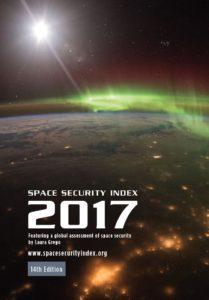Under Stress: Space Security Index 2017

The annual assessment of the security of outer space recently released at the United Nations warns of mounting stress from a combination of rapid technology change and geopolitical tensions.
Space Security Index 2017 tracks developments and activities related to four indicators of the security of outer space – environmental sustainability, access to and use of space, technologies for space security, and space governance – to capture long-term changes. Among them:
- Private sector investment is transforming space launch and space services
- Access to space-based data is accelerating around the world
- There is a shift to a more aggressive use of outer space as a potential domain of warfare;
- The U.S. Congress has expressed renewed interest in space-based missile defence.
The heightened possibility of warfare in outer space is of particular concern. In the included Global Assessment, Dr. Laura Grego of the Union of Concerned Scientists observes that “space has for decades been adjacent to conflict,” but “current trends put space at the center.” Efforts to restrict the use of force in outer space have not been successful.
Other sources of stress stem from ambitious new activities and investment from commercial actors, such as plans for large constellations of thousands of satellites. Such developments would transform the space environment and challenge the management of limited resources and space traffic.
A long-time advisor to the project, retired Canadian Ambassador Paul Meyer notes that "at a time of escalating global tensions, the preservation of secure and sustainable access to outer space takes on heightened importance." New norms might help to cope with new uses of space and new actors. But norms take time to solidify, and time is not on our side.
The release of the report coincides with the 50th anniversary of the Outer Space Treaty, which forms the foundation for global activities in outer space. Despite the mounting stress to this regime, SSI project manager Jessica West from the Canadian peace-and-security think tank Project Ploughshares sees “little effort by states parties to review and advance the core principals of the treaty.”
Space Security Index 2017 is part of the broader Space Security Index (SSI) project, which aims to improve transparency on space activities and provide a common, comprehensive, objective knowledge base to support the development of national and international policies that contribute to the security and sustainability of outer space. The Space Security Index project is a research partnership of a group of international organizations led by the Canadian nonprofit organization Project Ploughshares. Partners include The Simons Foundation in British Columbia; the Institute of Air and Space Law at McGill University in Montreal, Quebec; the Space Policy Institute at The George Washington University in Washington, DC; the Research Unit on Military Law and Ethics at the University of Adelaide Law School in Australia; and the School of Law at Xi'an Jiaotong University in China.
Visit The Simons Foundation's page on the Space Security Index (SSI) project for more information and to access previous editions of the SSI reports.